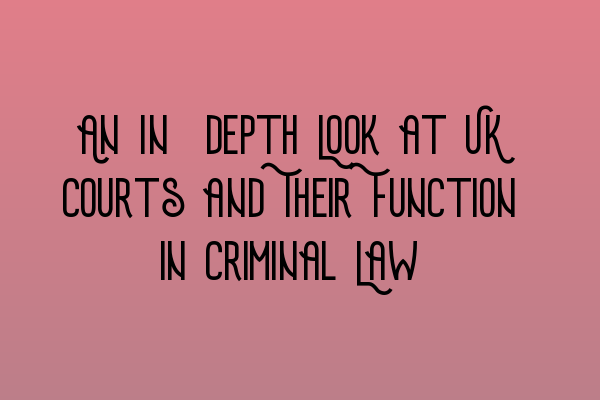An In-depth Look at UK Courts and Their Function in Criminal Law
Welcome to SQE Criminal Law & Practice Law UK. In this blog post, we will take an in-depth look at the UK courts and their function in criminal law. Understanding the structure and purpose of the courts is essential for anyone studying or practicing criminal law. So, let’s dive right in!
Overview of UK Courts
The UK has a hierarchical system of courts that deal with criminal cases. These courts range from the Magistrates’ Court, which handles minor offenses, to the Crown Court, which deals with serious criminal cases. In between, there are the Crown Court Circuit and the High Court, each with their own jurisdiction and role in the criminal justice system.
To gain a comprehensive understanding of the UK courts, it’s important to start from the bottom and work our way up. So, let’s begin with the Magistrates’ Court.
Magistrates’ Court
The Magistrates’ Court is the entry point for most criminal cases in the UK. It is presided over by magistrates who are legally qualified volunteers. They handle a wide range of offenses, from traffic violations to low-level crimes. The Magistrates’ Court is the court of first instance, where preliminary hearings and bail applications take place.
To gain a deeper insight into the Magistrates’ Court and its procedures, check out our related article on SQE 1 Practice Exam Questions.
Crown Court Circuit
The Crown Court Circuit is the next level in the hierarchy. It hears more serious criminal cases referred from the magistrates’ court. These cases involve indictable offenses that carry more severe punishments. The Crown Court Circuit is presided over by Circuit Judges and High Court Judges.
If you want to enhance your knowledge of the Crown Court Circuit, we recommend taking a look at our related article on SQE 1 Practice Mocks FLK1 FLK2.
High Court
The High Court is the highest court in the UK that deals with criminal law matters. It consists of three divisions: the Queen’s Bench Division, the Chancery Division, and the Family Division. The High Court has jurisdiction over the most serious criminal cases, including murder, terrorism, and complex fraud.
For those interested in preparing for the High Court, our related article on SQE 2 Preparation Courses provides valuable information.
The Function of UK Courts in Criminal Law
The UK courts in the criminal justice system serve various functions, including:
- Adjudicating guilt or innocence
- Imposing appropriate sentences
- Preserving the rule of law
- Protecting the rights of individuals
- Ensuring fair and just proceedings
These functions are essential in upholding justice and maintaining public confidence in the legal system.
To learn more about the preparation for UK court examinations, our related article on SQE 1 Preparation Courses provides valuable resources.
Conclusion
Understanding the UK courts and their function in criminal law is crucial for anyone pursuing a career in criminal justice or studying the subject. The hierarchical structure of the courts ensures that cases can be appropriately handled at each level.
If you are interested in staying up-to-date with the SRA SQE exam dates, visit our related article on SRA SQE Exam Dates.
We hope this in-depth look at UK courts has provided you with valuable insights. If you have any further questions or would like to discuss criminal law matters, feel free to contact us at SQE Criminal Law & Practice Law UK.
